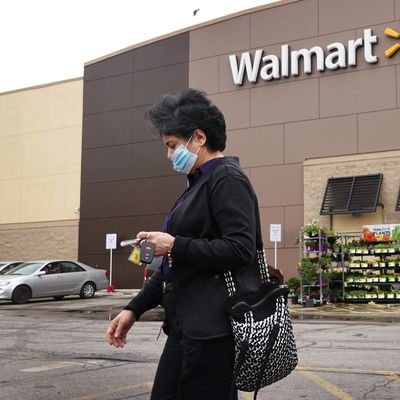
Following months of complaints from workers, Walmart will require customers to wear masks in stores, the company announced on Wednesday. Beginning July 20, “health ambassadors” will remind shoppers to wear masks, CNN reports; at Sam’s Club locations, associates will hand out complimentary masks to customers who aren’t wearing one. (Hours later, Kroger announced a similar mask mandate.) Walmart’s news comes too late for Walmart associates like Wando Evans, who died of COVID-19 in March after supervisors allegedly refused to let him go home sick. A wrongful death suit filed by his family further alleges that Walmart put workers in danger by failing to enforce proper social-distancing measures in stores.
Walmart’s belated announcement highlights an ongoing labor conflict. A store’s impulse to please customers, and its obligation to control shopper behavior in a pandemic, traps workers in a vulnerable place. They’re laboring on the front lines of a crisis that will likely stretch on for months, and their safety often depends on decisions made by other people — by lawmakers, by their bosses, and by the customers who still flock to their stores. If officials and stores don’t force shoppers to wear masks, they often won’t, and workers pay the price.
Members of United for Respect, an advocacy group for retail workers, have been asking Walmart and other chains to enforce universal mask requirements, along with other safety measures, since March. In a survey of UFR’s members, only 9 percent said they could reliably practice social distancing at work in April; 2 in 5 respondents said they believed the company would protect workers and customers alike. Walmart waited another three months to listen. While workers welcomed Walmart’s mask requirement, they still want to know what took so long. “Why did it take more than three months and 130,000 deaths for Walmart to face up to the cost of this pandemic, and mask up for its customers, associates, and our communities?” asked United for Respect member and Walmart associate Cyndi Murray in a press release for the group. (Murray previously discussed her activism with Intelligencer.)
“Even now, Walmart associates have not received hourly hazard pay for putting their lives in jeopardy to keep shelves stocked and kitchen tables full,” she added. “Hundreds of associates and customers, particularly in Black and brown communities, have needlessly been exposed to the virus due to Walmart’s profit over people mindset. And while this is an important measure for public health, this new policy will inevitably put retail associates in difficult and even dangerous situations.”
Murray’s statement invokes a grim pandemic reality, and illustrates the possible deficiencies of Walmart’s proposed response. Not only is the mask requirement late, it also may place the onus of enforcement on workers themselves. That could be dangerous. Front line workers, a category that includes Walmart associates, have experienced rising levels of customer abuse. In at least one case, that abuse had deadly consequences. In May, a customer in Detroit shot and killed a Dollar General security guard who asked the man’s relative to wear a mask.
The United Food and Commercial Workers union, which represents grocery-store workers employed by chains like Kroger, has repeatedly warned that lax security measures put members in danger. On Wednesday, after Kroger announced its own mask mandate, the union urged “every governor and mayor” to “step up and make masks mandatory at all supermarkets and retail stores.” In the absence of such measures, the union’s members have suffered. When UFCW surveyed its members in April, it found that 85 percent said customers weren’t practicing social distancing. Another 29 percent said that customers have been hostile to them since the start of the pandemic. At the time, UFCW’s president, Marc Perrone, told Intelligencer that stores needed more security and involvement from supervisors in order to protect more vulnerable employees.
In her statement, Murray said Walmart still needs to clarify how mask enforcement will work. In the meantime, associates will show up to work as usual, with one less reason to worry, and another new set of concerns to bear.






























